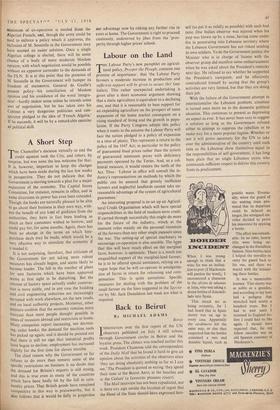SOLISTELLE IN OFFICE
THE news that M. Jacques Soustelle is to become Minister of Information in General de Gaulle's govern- ment will come as an un- pleasant surprise to those who • had hoped that the general II would continue to steer 'clear of the men of Algiers when choosing his colleagues. Even, if M. Soustelle's appointment is a reward for good behaviour (he has been remarkably reticent during the last few weeks) or marks his personal dissociation from the com- mittees of public safety, it is still an ominous sign. Throughout he has been the chosen leader of the partisans of 'French Algeria.' His belief in integration of the French and Moslem popula- tions may be more sincere than that of M. de Sdrigny, but he would be irrevocably opposed to any negotiation with the FLN, though peace in Algeria can only be based on negotiation of some sort. What General de Gaulle has done is to take into his cabinet a kind of litmus paper, by which the men of May 13 will be able to test the nature of his policies. For it will always be open to M. Soustelle to resign and create a potential crisis over whatever issue he pleases.
The reasons for thii appointment and for the rather mysterious demotion of M. Andrd Malraux are probably connected with General de Gaulle's recent tour of Algeria. In the course of this his main achievement was the consolidation of army support. Indeed, he refused to receive a delegation of the Algiers committee, and was careful to point out that he was meeting General Massu 'as General Massu' rather than as its president. On the other hand, decrees have been published organising the Algerian elections on a single list with votes for Moslem women and a new electoral roll. These measures, added to the agreement on the evacuation of French troops from Tunisia, must have angered the committees, and there have been reports of the increasing isolation of the Gaullists on them. M. Soustelle's new position may represent an attempt by General de Gaulle to cut the ground from under the feet of his North African opponents. If so, it is a risky manoeuvre. In particular, the freedom of the press in metro- politan France is far less safe in the hands of M. Soustelle than in those of M. Malraux. There have already been confiscations of L'Express and France-Observateur on the orders of the Ministry of War; any extension of this wretched adminis- trative practice would create more than a threat to freedom of information. General de Gaulle's future intentions will be judged by his decisions on issues like these.
So far the present French Government has some achievements to its credit. Something has been done towards restoring discipline in the army— how badly this was needed may be gathered from M. Mach's statement that four out of nine generals commanding the military regions of metropolitan France were openly sympathetic to the Algerian revolt and that the police and gen- darmerie had been corrupted. The Tunisian agreement—the very issue on. which M. Gaillard was defeated—has gone through without a mur- mur. For the Algerian elections to do the same, a minimum of co-operation is needed from the Algerian French; and, though the army could be used to enforce a policy which it approves, the Inclusion of M. Soustelle in the Government may have seemed an easier solution. Once a single Algerian college is elected, there will be some chance of a body of more moderate Moslem opinion, with which negotiation would be possible without an apparent surrender to the demands of the FLN. It is at this point that the presence of M. Soustelle in the Government will hamper its freedom of manoeuvre. General de. Gaulle's present policy—his conciliation of Moslem opinion and his avoidance of the word 'integra- tion'—hardly makes sense unless he intends some sort of negotiation, but he has taken into his Cabinet a very dangerous politician and con- spirator pledged to the idea of 'French Algeria.' If he succeeds, it will be by a remarkable exercise Of political skill.



































 Previous page
Previous page